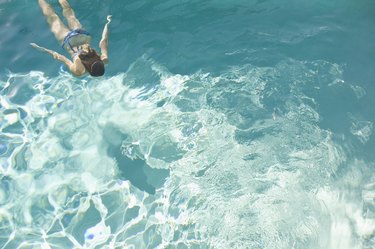
Acid reflux is a condition in which acidic stomach contents leak backwards into the esophagus. When refluxed acidic stomach contents touch the lining of the esophagus, they may cause a burning sensation in the chest called heartburn. Acid reflux occurs when the lower esophagus sphincter muscle opens spontaneously or does not close properly. Acid reflux may occur more frequently in swimmers.
Swimming Techniques
Video of the Day
Acid reflux is more likely to occur when performing certain swimming techniques. Swimming in a prone position increases pressure on the stomach region, which causes stomach contents to be pushed into the esophagus, according to United States Masters Swimmers. Holding your breath or straining during swimming can also increase intra-abdominal pressure. Learn how to turn your head to the side to take a breath during every swimming stroke. Breathe and exhale slowly without straining, according to Cancernet.
Video of the Day
Diet Tips
Certain dietary modifications can help reduce acid reflux during swimming. Wait at least two hours after eating before you swim. Swimming while your stomach is full increases the risk for acid reflux. Certain food products are more likely to cause acid reflux than others. Avoid fatty foods, tomato-based products, caffeine and citrus fruits one to two hours before swimming.
Drugs
If you have chronic acid reflux, your doctor may prescribe acid-reducing drugs such as proton pump inhibitors and H2 acid blockers. These drugs reduce the secretion of stomach acid. The drugs can help prevent acid during swimming or other physical exercises. Take acid-reducing drugs every day. Consult with your doctor before you stop taking acid-reducing drugs. Acid reflux may return if you discontinue using the drugs.
Lifestyle Changes
If you have frequent acid reflux, certain lifestyle adjustments can help prevent frequent acid reflux. Avoid straining during bowel movement or when lifting heavy objects. Lose weight if you are overweight, because excess abdominal fat can increase intra-abdominal pressure and lead to acid reflux. Avoid lying down immediately after eating. Raise the head of the bed 6 to 8 inches high to prevent nighttime acid reflux.
Is this an emergency? If you are experiencing serious medical symptoms, please see the National Library of Medicine’s list of signs you need emergency medical attention or call 911.